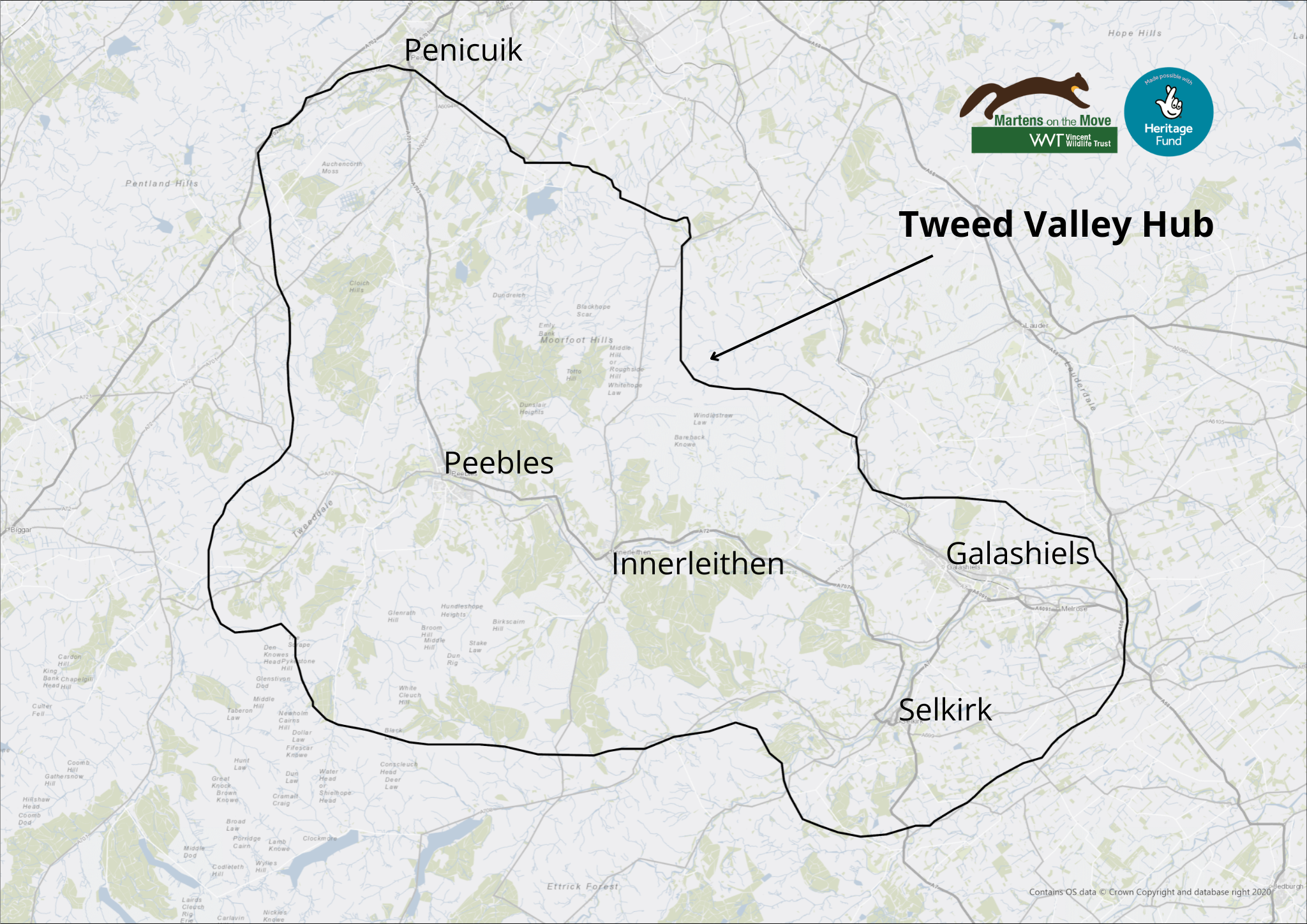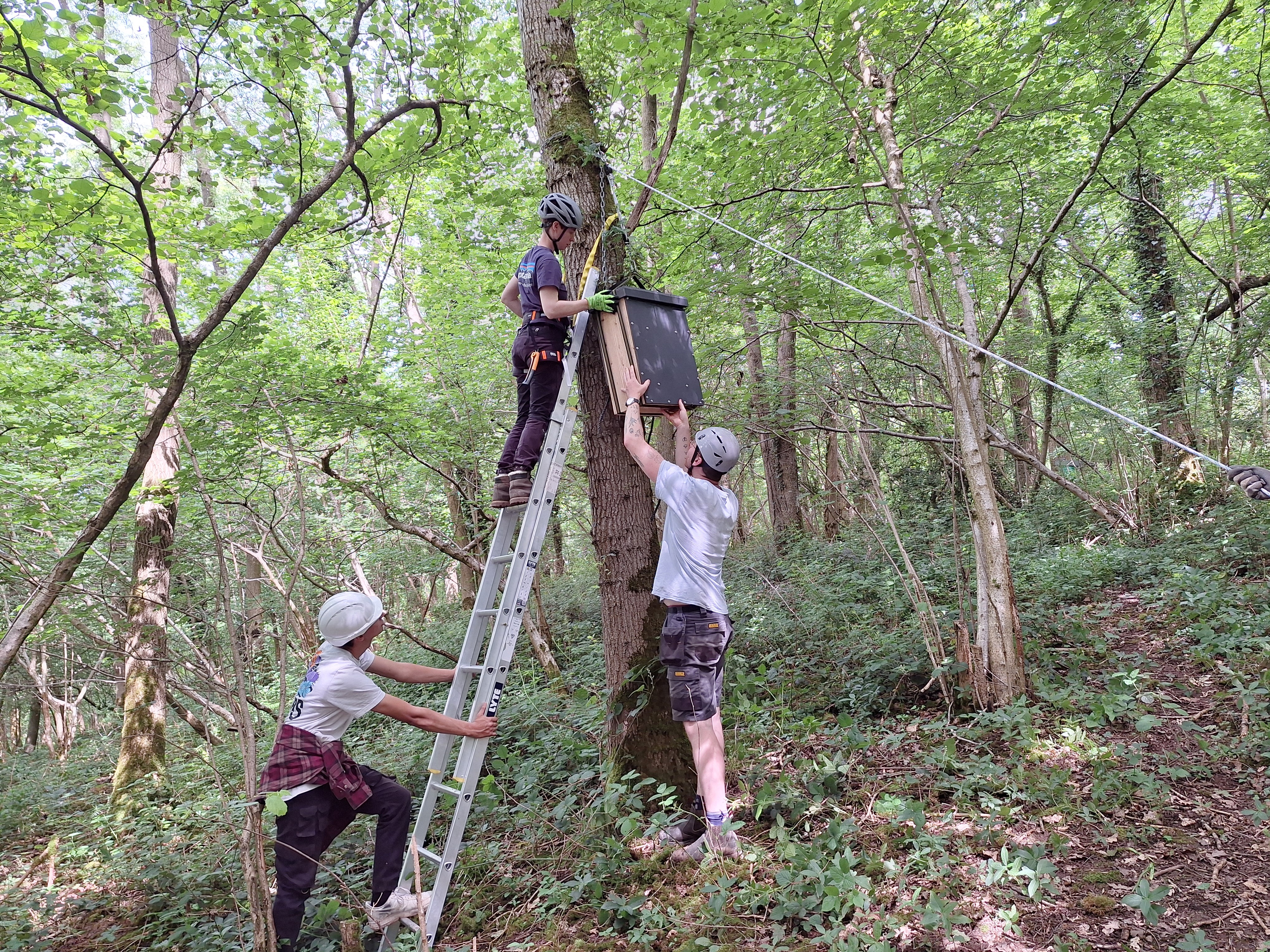Pine Martens and protocols — working with Martens on the Move volunteers to monitor den boxes


Volunteers are crucial to our work — whether it's the traditional conservation volunteer activities or taking part in wider citizen science surveys — we wouldn't be able to achieve as much for threatened mammal conservation without their help — whatever skills they bring or whatever time they can give, it all helps to make a difference.
Irish stoats, polecats and pine Martens from October to December 2024
Time gifted on a variety of volunteer opportunities for VWT's work
Bats counted during the 2024 summer season, adding to the National Bat Monitoring Programme
Volunteers get involved in a variety of ways, including monitoring bats during summer emergence events or winter hibernation counts; monitoring a pine marten den box; setting up acoustic bat detectors in woodlands; or helping with the maintenance of bat reserves.
Opportunities can often be seasonal, have fixed start and end dates, or they may be home-based and continuous. Check out our current volunteering opportunities below.

Join a long-term woodland bat box scheme for barbastelle bats.
Location: near Little Malvern, Worcestershire
VWT has been monitoring the bat boxes for the barbastelle, an elusive woodland species, since 2004.

What’s involved? Join VWT’s Bat Team as they carry out bat box checks for a long-term ringing programme for barbastelle bats. The boxes are located throughout the woodland site, high in the trees and the activity involves a full day of walking, helping to carry equipment, checking bat boxes and recording data.
Handling of bats is not required but may be considered if you have a current Bat Licence and are experienced in bat handling — and are vaccinated against bat lyssavirus.
Commitment
What will you need?
Join our network of volunteers monitoring horseshoe bat roosts for the National Bat Monitoring Programme.
Help to carry out emergence counts of lesser and greater horseshoe bats at one or more of VWT bat reserves. These annual counts are essential for monitoring the bat colonies at the reserves and contribute to Bat Conservation Trust’s National Bat Monitoring Programme.
The counts also help to alert VWT's Bat Team to any changes in colony size and structure — and may inform future works to improve the roosts.
Location Various reserves in southwest England and Wales. Some of the areas listed below have more than one reserve to choose from.
Locations of reserves and months during which counts are taken.
What's involved
Join VWT volunteers to count bats emerging from the roost using click counters. Bat detectors and infra-red cameras will be available at some reserves where needed for more accurate counting. Training is provided via videos and on the night.
And/or
NB There may be opportunity to help with surveys at other times of year.
Join the Martens on the Move project team as a Pine Marten Den Box Ranger and learn how to install pine marten den boxes.
Location: Tweed Valley, South of Scotland — See map.

What’s involved? Join Victoria Chanin (Martens on the Move Project Officer) for in-the-field training on how to install pine marten den boxes. Attendees will get hands-on experience learning how to choose the right tree and safely install a den box on it.
Suitable for beginners and those who want to improve their skills.
Once trained, volunteers will be part of a team of volunteers led by Victoria, to support den box installation in the Tweed Valley area. Over time, there will be opportunities to learn how to check, clean and maintain den boxes as required.

Training dates (all in the Tweed Valley area)
Please note You do not have to attend all three days of the training. Each day will cover theory and practical, as well as Health and Safety. Meeting locations for Wednesday and Thursday will be confirmed once you have signed up.
Please book via the link below — spaces are limited so book soon.
If you are unable to attend a workshop date and are interested in volunteering in this role in the Tweed Valley, please submit an application and we will be in touch when there are opportunities to get involved at a later date.
Commitment
What will you need?
Please note VWT offers a range of support for our volunteers, including agreed out-of-pocket expenses. Full details will be provided upon registering as a volunteer.
We welcome volunteers of all ages but we do ask that any volunteer under the age of 18 is accompanied by a parent or guardian who is also registered as a volunteer with us.
We share our volunteering opportunities that are open to new volunteers on this page and through our Social Media platforms. Many of our volunteering opportunities are seasonal so we may not always have opportunities to share with you — but please keep checking this page.
Some of our volunteering takes place alongside VWT staff and in groups. Other opportunities allow volunteers to be more independent and carry out activities on their own.
Most of our volunteer roles ask for no prior experience and instead focus on characteristics that suit the volunteer role. All the volunteer roles include information about what is needed for the activity to help decide whether the role is suitable for you.
In most circumstances, yes. Volunteering activities are often in the field and may involve getting to remote places. However, some of our volunteers are able to carry out volunteer roles on their own land — eg, hosting a pine marten den box in their woodland, or monitoring a trail camera in a nearby location.
Commitment levels can vary depending on the activity. During the main monitoring season (April-September) there is a peak of activities — during this period some activities take place one day a month for at least five hours in the field OR, once in June for three hours during an evening — it really depends on the activity. Check the ‘commitment’ details of each volunteer opportunity in the Current Opportunities section. We recognise that people have varying amounts of time available and so we try to be flexible where we can.
Yes — occasionally we do recruit for volunteer roles that are office-based or home-based. These will be shared in Current Opportunities when available.
Share your sightings of pine martens and contribute to the first ever National Pine Marten Monitoring Programme. For further information and to submit a sighting, visit the Martens on the Move website.
Do you own or manage woodland in the Brechfa, Shropshire-Herefordshire, Solway or Tweed Valley Monitoring Hub areas of the Martens on the Move project? Could you host a den box on your land and provide a site for pine martens to rest and breed. Visit the Martens on the Move website to find out more.
We would like to hear from you if you are regularly monitoring pine marten den boxes or monitoring stations, or carrying out scat surveys in our Martens on the Move Strategic Recovery Areas so that we can include your data in the National Pine Marten Monitoring Programme and get your martens on the map.
